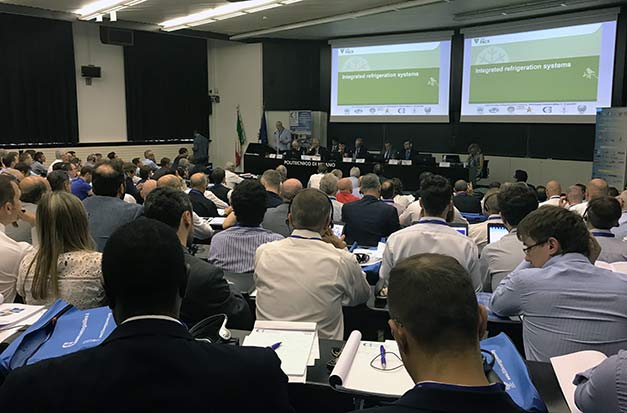Flammable limits threaten HFC phase down
10th June 2017
ITALY: As the world battles to reduce HFC emissions, AHRI president Stephen Yurek has called for changes to the barriers that restrict the use of flammable refrigerants.
Speaking at this weekend’s XVII European Conference on refrigeration at the Politecnico of Milan, Yurek, president and CEO of the US manufacturers’ group, said that restrictions in most international, US and European building and safety codes are one of the biggest obstacles to meeting the HFC phase down aspirations of the Kigali agreement.
“We have to work together to change the regulatory safety barriers that are currently in place that restrict the use of 2L and A3 refrigerants,” he said.
He pointed out that currently most building and safety codes do not recognise A2L refrigerants and at the same time “severely restrict the use of any flammable refrigerants in the occupied space”.
“Those codes need to be changed,” he said.
“We need the safety standards to tell you about charge sizes and how these refrigerants can be used in equipment. Then, when those are complete, we need to modify the building codes – the residential building codes, the commercial building codes – to reflect those new safety standards that will allow the use of 2L and A3 refrigerants.
The AHRI president and CEO revealed that the first report into A2L “mildly flammable” refrigerants from the $5m-plus research programme funded by AHRI, ASHRAE, the US Department of Energy and the state of California, was about to be published.
With the first report completed, he admitted that they now needed to do more work on A3 refrigerants and to look at different types of leak scenarios. Stephen Yurek also suggested that more sensors and better sensor technology were needed and saw education and training as being “critically important”.

Kigali
Earlier, Stephen Yurek had again sought to allay fears that the Kigali agreement to include HFC phase downs under the Montreal Protocol might go the same way as the USA’s rejection of the Paris climate deal.
Maintaining that the two deals were very different, he reaffirmed the US industry’s support for the Kigali agreement and was hopeful that it would be ratified by the Senate.
While Republicans currently hold the majority in the Senate, the 67 votes (out of 100) needed will require a substantial mix of both democrats and republicans to ensure ratification.
In his paper to the audience of around 200 delegates at the conference, Stephen Yurek stated: “The main challenge for industry will be to persuade republicans that this treaty is in our industry’s best interest – that we are supportive and fully prepared to carry out its provisions.”
He told the conference: “It requires two thirds of the senate to approve and ratify this agreement, which in any circumstance in the US is a very difficult thing to do, but we’re very hopeful as all the other amendments to the Montreal Protocol have been passed unanimously by the US Senate.”
On Paris, he said: “Treaty or no treaty, the US has already made great progress towards reducing its greenhouse gas emissions and will continue go do so. Treaties are important but actual results are what makes the difference. And no matter what the government does, the industry is moving forward both with Kigali as well as with the reduction of greenhouse gases.”







